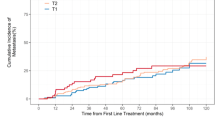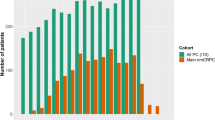Abstract
Background
Metastatic castrate sensitive prostate cancer (mCSPC) is a heterogeneous disease state with variable prognosis. Although several life-prolonging systemic agents are available, there is no robust multivariable model to predict prognosis and improve risk stratification in mCSPC. The objective of this study was to build and validate a multivariable prognostic model to predict overall survival (OS) in mCSPC.
Methods
We used data from LATITUDE, a phase III randomized controlled trial in which men with de novo mCSPC were randomly allocated to either ADT plus abiraterone or ADT with placebo. Patients with non-missing data (n = 1,058) were randomly split in a 70:30 ratio to training (n = 743) and testing (n = 315) sets. Elastic net regression was used for variable selection. A multivariable Cox regression model for OS was then fitted using the selected variables. The predictive accuracy of the model was assessed on the testing set using the time-dependent area under curve (tAUC) with bootstrapped confidence intervals [CI] primarily for OS and secondarily for radiographic progression-free survival (rPFS).
Results
The 11 prognostic variables in the final model were performance status, number of skeletal metastases, Gleason score, presence of liver metastasis, worst pain score, albumin, lactate dehydrogenase, prostate-specific antigen, hemoglobin, and treatment regimen. The tAUC for predicting OS at 2- and 3-years was 0.74 (95% CI, 0.67–0.80) and 0.72 (95% CI, 0.65–0.77), respectively. The tAUC for rPFS at 2- and 3-years was 0.72 (95% CI, 0.65–0.77) and 0.77 (95% CI, 0.70–0.82), respectively.
Conclusions
A prognostic model for men with de novo mCSPC was developed and validated in an independent testing set. Our model had high accuracy for predicting OS and rPFS. The model includes commonly used clinical and laboratory parameters and can guide risk stratification of these patients for participation in future trials.
This is a preview of subscription content, access via your institution
Access options
Subscribe to this journal
Receive 4 print issues and online access
$259.00 per year
only $64.75 per issue
Buy this article
- Purchase on Springer Link
- Instant access to full article PDF
Prices may be subject to local taxes which are calculated during checkout



Similar content being viewed by others
Data availability
This study, carried out under YODA Project # 2021–4565, used data obtained from the Yale University Open Data Access Project, which has an agreement with JANSSEN RESEARCH & DEVELOPMENT, L.L.C. The interpretation and reporting of research using this data are solely the responsibility of the authors and does not necessarily represent the official views of the Yale University Open Data Access Project or JANSSEN RESEARCH & DEVELOPMENT, L.L.C.
References
Roy S, Morgan SC. Who dies from prostate cancer? An analysis of the surveillance, epidemiology and end results database. Clin Oncol. 2019;31:630–6. http://www.ncbi.nlm.nih.gov/pubmed/31130340.
Reese AC, Wessel SR, Fisher SG, Mydlo JH. Evidence of prostate cancer “reverse stage migration” toward more advanced disease at diagnosis: Data from the Pennsylvania Cancer Registry. Urologic Oncol: Semin Original Investig. 2016;34:335.e21–335.e28.
Cornford P, Bellmunt J, Bolla M, Briers E, de Santis M, Gross T, et al. EAU-ESTRO-SIOG Guidelines on Prostate Cancer. Part II: Treatment of relapsing, metastatic, and castration-resistant prostate cancer. Eur Urol. 2017;71:630–42. https://pubmed.ncbi.nlm.nih.gov/27591931/
Fizazi K, Tran N, Fein L, Matsubara N, Rodriguez-Antolin A, Alekseev BY, et al. Abiraterone plus prednisone in metastatic, castration-sensitive prostate cancer. N. Engl J Med. 2017;377:352–60. https://doi.org/10.1056/NEJMoa1704174.
James ND, de Bono JS, Spears MR, Clarke NW, Mason MD, Dearnaley DP, et al. Abiraterone for prostate cancer not previously treated with hormone therapy. N. Engl J Med. 2017;377:338–51. https://doi.org/10.1056/NEJMoa1702900.
Parker CC, James ND, Brawley CD, Clarke NW, Hoyle AP, Ali A, et al. Radiotherapy to the primary tumour for newly diagnosed, metastatic prostate cancer (STAMPEDE): a randomised controlled phase 3 trial. Lancet. 2018;392:2353–66.
Davis ID, Martin AJ, Stockler MR, Begbie S, Chi KN, Chowdhury S, et al. Enzalutamide with standard first-line therapy in metastatic prostate cancer. N. Engl J Med. 2019;381:121–31. https://doi.org/10.1056/nejmoa1903835.
Chi KN, Agarwal N, Bjartell A, Chung BH, Pereira de Santana Gomes AJ, Given R, et al. Apalutamide for metastatic, castration-sensitive prostate cancer. N. Engl J Med 2019;381:13–24. https://pubmed.ncbi.nlm.nih.gov/31150574/
Sweeney CJ, Chen Y-H, Carducci M, Liu G, Jarrard DF, Eisenberger M, et al. Chemohormonal therapy in metastatic hormone-sensitive prostate cancer. N. Engl J Med. 2015;373:737–46.
James ND, Sydes MR, Clarke NW, Mason MD, Dearnaley DP, Spears MR, et al. Addition of docetaxel, zoledronic acid, or both to first-line long-term hormone therapy in prostate cancer (STAMPEDE): Survival results from an adaptive, multiarm, multistage, platform randomised controlled trial. Lancet. 2016;387:1163–77.
Kyriakopoulos CE, Chen YH, Carducci MA, Liu G, Jarrard DF, Hahn NM, et al. Chemohormonal therapy in metastatic hormone-sensitive prostate cancer: long-term survival analysis of the randomized phase III E3805 chaarted trial. J Clin Oncol. 2018;36:1080–7.
Glass TR, Tangen CM, Crawford ED, Thompson I. Metastatic carcinoma of the prostate: Identifying prognostic groups using recursive partitioning. J Urol. 2003;169:164–9.
Gravis G, Boher JM, Fizazi K, Joly F, Priou F, Marino P, et al. Prognostic factors for survival in noncastrate metastatic prostate cancer: validation of the glass model and development of a novel simplified prognostic model. Eur Urol. 2015;68:196–204.
Akamatsu S, Kubota M, Uozumi R, Narita S, Takahashi M, Mitsuzuka K, et al. Development and validation of a novel prognostic model for predicting overall survival in treatment-naïve castration-sensitive metastatic prostate cancer. Eur Urol Oncol. 2019;2:320–8. https://doi.org/10.1016/j.euo.2018.10.011. Available from
Wallis CJD, Malone S, Cagiannos I, Morgan SC, Hamilton RJ, Basappa NS, et al. Real-world utilization of androgen deprivation therapy-intensification among older canadian men with de novo metastatic prostate cancer. JNCI Cancer Spectrum. 2021; Available from: https://doi.org/10.1093/jncics/pkab082/6379721
Fizazi K, Tran NP, Fein L, Matsubara N, Rodriguez-Antolin A, Alekseev BY, et al. Abiraterone acetate plus prednisone in patients with newly diagnosed high-risk metastatic castration-sensitive prostate cancer (LATITUDE): final overall survival analysis of a randomised, double-blind, phase 3 trial. Lancet Oncol. 2019;20:686–700.
Ali A, Hoyle A, Haran ÁM, Brawley CD, Cook A, Amos C, et al. Association of bone metastatic burden with survival benefit from prostate radiotherapy in patients with newly diagnosed metastatic prostate cancer: a secondary analysis of a randomized clinical trial. JAMA Oncol. 2021;7:555–63. https://jamanetwork.com/journals/jamaoncology/fullarticle/2776418
Bernard B, Burnett C, Sweeney CJ, Rider JR, Sridhar SS. Impact of age at diagnosis of de novo metastatic prostate cancer on survival. Cancer 2020;126:986–93.
Kyriakopoulos CE, Chen YH, Carducci MA, Liu G, Jarrard DF, Hahn NM, et al. Chemohormonal therapy in metastatic hormone-sensitive prostate cancer: long-term survival analysis of the randomized phase III E3805 chaarted trial. J Clin Oncol. 2018;36:1080–7.
Wallis CJD, Shayegan B, Morgan SC, Hamilton RJ, Cagiannos I, Basappa NS, et al. Prognostic association between common laboratory tests and overall survival in elderly men with de novo metastatic castration sensitive prostate cancer: A population-based study in canada. Cancers. 2021;13.
Friedman J, Hastie T, Tibshirani R, Regularization paths for generalized linear models via coordinate descent. J Stat Softw. 2010];33:1. Available from: /pmc/articles/PMC2929880/.
Uno H, Cai T, Tian L, Wei LJ. Evaluating prediction rules for t-year survivors with censored regression models. J Am Stat Assoc [Internet]. 2007;102:527–37. https://www.tandfonline.com/action/journalInformation?journalCode=uasa20
Harrell FE, Regression Modeling Strategies. Berlin, Heidelberg: Springer-Verlag; 2006.
Morris TP, Jarvis CI, Cragg W, Phillips PPJ, Choodari-Oskooei B, Sydes MR, Proposals on Kaplan–Meier plots in medical research and a survey of stakeholder views: KMunicate. 9, BMJ Open. BMJ Publishing Group; 2019. p. e030215. Available from: http://bmjopen.bmj.com/
Therneau TM, Grambsch PM, Modeling survival data: extending the Cox model. Springer; 2000. 350 p. Available from: https://cran.r-project.org/web/packages/survival/citation.html
Potapov S, Adler W, Schmid Matthias. survAUC: Estimators of prediction accuracy for time-to-event data. R package version 1.0-5. https://CRAN.R-project.org/package=survAUC. 2012.
Rusthoven C, Carlson J, Waxweiler T, Yeh N, Raben D, Flaig T, et al. The prognostic significance of Gleason scores in metastatic prostate cancer. Urol Oncol. 2014;32:707–13. https://pubmed.ncbi.nlm.nih.gov/24629494/
Mori K, Kimura S, Parizi MK, Enikeev DV, Glybochko PV, Seebacher V, et al. Prognostic value of lactate dehydrogenase in metastatic prostate cancer: a systematic review and meta-analysis. Clin Genitourin Cancer. 2019;17:409–18.
Mori K, Janisch F, Mostafaei H, Lysenko I, Karakiewicz P, Enikeev D, et al. Prognostic value of hemoglobin in metastatic hormone-sensitive prostate cancer: a systematic review and meta-analysis. Clin Genitourin Cancer. 2020;18:e402–9. https://pubmed.ncbi.nlm.nih.gov/32007439/
Wallis CJD, Klaassen Z, Bhindi B, Goldberg H, Chandrasekar T, Farrell AM, et al. Comparison of abiraterone acetate and docetaxel with androgen deprivation therapy in high-risk and metastatic hormone-naïve prostate cancer: a systematic review and network meta-analysis. Eur Urol. 2018;73:834–44. https://pubmed.ncbi.nlm.nih.gov/29037513/
Wang L, Paller CJ, Hong H, de Felice A, Alexander C, Brawley OW Comparative effectiveness of systemic treatments for metastatic castration-sensitive prostate cancer: A parametric survival network meta-analysis of randomized controlled trials. https://doi.org/10.1200/JCO20203815_suppl5532. 2020;38(15_suppl):5532–5532.
Mori K, Mostafaei H, Motlagh RS, Pradere B, Quhal F, Laukhtina E, et al. Systemic therapies for metastatic hormone-sensitive prostate cancer: network meta-analysis. BJU International. 2021; Available from: https://doi.org/10.1111/bju.15507
Mori K, Janisch F, Parizi MK, Mostafaei H, Lysenko I, Enikeev DV, et al. Prognostic value of alkaline phosphatase in hormone-sensitive prostate cancer: a systematic review and meta-analysis. Int J Clin Oncol. 2019;25:247–57. https://link.springer.com/article/10.1007/s10147-019-01578-9
Metwalli AR, Rosner IL, Cullen J, Chen Y, Brand T, Brassell SA, et al. Elevated alkaline phosphatase velocity strongly predicts overall survival and the risk of bone metastases in castrate resistant prostate cancer. Urol Oncol. 2014;32:761. cited 2021 Available from: /pmc/articles/PMC4129955/
Brown JE, Sim S. Evolving role of bone biomarkers in castration-resistant prostate cancer. Neoplasia 2010;12:685–96.
Funding
The original LATITUDE study was funded by Janssen Oncology. However, the employees of the funder had no role in study design, data collection, data analysis, data interpretation, and writing of the report. The corresponding author had full access to all data in the study and final responsibility for the decision to submit for publication.
Author information
Authors and Affiliations
Contributions
Conception and design: SR and SM. Administrative support: SM, CW, SR, DM, JM, and DS. Provision of study material or patients: SM, SM, SR, CW, and FS. Collection and assembly of data: SM, SR, YS, SM, FS, AUK, DM, and SG. Data analysis and interpretation: SR, YS. Manuscript writing: All authors. Final approval of manuscript: All authors. Accountable for all aspects of the work: All authors.
Corresponding authors
Ethics declarations
Competing interests
Outside of this work, Dr. Malone has received honoraria from Astellas, Bayer, Janssen, and Sanofi; and travel and accommodations support from TerSera and Sanofi. Outside of this work, Dr. Morgan reports personal fees from Astellas, Bayer, Janssen, and TerSera. Dr. Roy reports a research grant from Abbvie-Canadian Association of Radiation Oncology. Dr. Wallis reports other from Janssen Oncology, other from SESEN Bio, outside the submitted work. Honoraria. Dr. Kishan reports personal fees and research support from ViewRay, Inc., and personal fees from Varian Medical Systems, Inc., and Intelligent Automation, Inc., outside the submitted work. Dr. Saad reports grants, personal fees, and non-financial support from Janssen, during the conduct of the study; grants, personal fees, and non-financial support from Astellas, grants, personal fees, and non-financial support from Bayer, outside the submitted work. Dr. Spratt reports personal fees from Blue Earth, personal fees from Janssen, personal fees from AstraZeneca, outside the submitted work. The other coauthors have no competing financial interests.
Additional information
Publisher’s note Springer Nature remains neutral with regard to jurisdictional claims in published maps and institutional affiliations.
Supplementary information
Rights and permissions
About this article
Cite this article
Roy, S., Sun, Y., Wallis, C.J.D. et al. Development and validation of a multivariable prognostic model in de novo metastatic castrate sensitive prostate cancer. Prostate Cancer Prostatic Dis 26, 119–125 (2023). https://doi.org/10.1038/s41391-022-00560-3
Received:
Revised:
Accepted:
Published:
Issue Date:
DOI: https://doi.org/10.1038/s41391-022-00560-3
This article is cited by
-
Nomograms in PCa: where do we stand
Prostate Cancer and Prostatic Diseases (2023)



